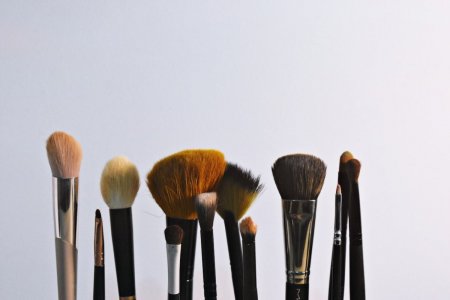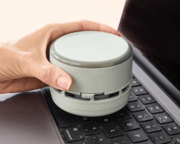Do you make this unhygienic mistake with your makeup? Over 50% of people do!
- Replies 7
There isn't a right or wrong way to use makeup. Mastering beauty looks can be an art form for some or a quick daily ritual for others. Either way, what kind of looks you create should bring you joy and make you feel your best and certainly shouldn’t be causing any health or skin issues…
While there are no hard-and-fast rules, there are a few practices that every makeup user should pick up for the sake of good hygiene – unfortunately, though, a recent survey of 564 people conducted by the Mind Body Green online magazine team shows these best practices might not be so widespread. So are you guilty of any of them?
Not cleaning your brushes
This one is a big one, members. Next time you write a list of household chores, make sure ‘cleaning your makeup brushes’ is on it! This practice is essential for eliminating bacteria and keeping your makeup brushes in tip-top shape.
According to the survey cited above, only 20% of makeup users reported cleaning their brushes every month, even though the recommended cleaning frequency is weekly. If you don’t use your brushes often, you might be able to get away with biweekly cleaning, but for the daily makeup wearers out there, once per week is definitely essential.
If you’re sitting there thinking that your makeup brushes are fine, and don’t need cleaning then you might want to think again. Unfortunately, there is so much bacteria on your makeup brushes for a multitude of reasons - bacteria from your skin, from your makeup, from your makeup bag, or even if your makeup brush has been sitting on a bench. Recently, when researchers tested bacteria levels on participants' brushes, they found that even toilet seats are cleaner than these tools—eight times cleaner to be specific, and well… We all clean our toilet seats, right?
If you’re unsure how to clean your makeup brushes, do not worry! They are so easy to clean. We’ve found a great video which we’ve popped in below for you which shows you what you need to use to clean them and the best way to clean them to keep them in good condition. There are multiple ways, including just using soap and warm water, shampoo and even a specific makeup brush cleaner.
Never replacing your brushes
According to the same survey, one in five makeup users never replace their brushes – and this is something we would recommend avoiding, if possible. Overused/old brushes can contribute to accumulated bacteria as well as put a damper on some aspects of our usual makeup routine you see, overused brushes can get in the way of putting on your makeup correctly i.e. it might not blend as well as it used to because there is a bunch of old makeup and bacteria stuck on the brush.
Even if you tend to take care of your brushes meticulously by cleaning them weekly, no brush lasts forever. Keep an eye out for fraying bristles and bristles that refuse to hold their shape even post-cleanse, as this is a sign that it might be time to say goodbye to those beloved tools...
Sharing makeup tools
Okay, members, we wouldn’t be surprised if most of us here have shared a makeup tool or two! It could have even been your sneaky grandchild who snuck into the bathroom and decided to paint the room with makeup (we’ve all been there).
A whopping 56% of respondents confessed sharing their makeup kit with others - which researchers have described as being 'a big no.' Sharing accessories like your brushes, mascara etc. can become quite dangerous, especially when it comes to using products around/near our eyes. This includes everything from eyeshadow brushes, to mascara, to lash curlers and even eyeliner pencils. All of these tools will have your bacteria on them and should not be shared around.
According to researchers, ‘Bacteria from dirty facial tools can result in poor eye health that may affect your vision, so never use others' devices.’ So while it may seem like a nice thing to do, sharing makeup tools can affect your skin behind the scenes.
So, are you guilty of any of the above unhygienic makeup practices? I know I sure am! In fact, I’m putting cleaning my makeup brushes on my weekend to-do list! Do you know of any other makeup no-nos that we didn’t touch on in this article? We’d love to hear what they are in the comments below!
While there are no hard-and-fast rules, there are a few practices that every makeup user should pick up for the sake of good hygiene – unfortunately, though, a recent survey of 564 people conducted by the Mind Body Green online magazine team shows these best practices might not be so widespread. So are you guilty of any of them?
Not cleaning your brushes
This one is a big one, members. Next time you write a list of household chores, make sure ‘cleaning your makeup brushes’ is on it! This practice is essential for eliminating bacteria and keeping your makeup brushes in tip-top shape.
According to the survey cited above, only 20% of makeup users reported cleaning their brushes every month, even though the recommended cleaning frequency is weekly. If you don’t use your brushes often, you might be able to get away with biweekly cleaning, but for the daily makeup wearers out there, once per week is definitely essential.
If you’re sitting there thinking that your makeup brushes are fine, and don’t need cleaning then you might want to think again. Unfortunately, there is so much bacteria on your makeup brushes for a multitude of reasons - bacteria from your skin, from your makeup, from your makeup bag, or even if your makeup brush has been sitting on a bench. Recently, when researchers tested bacteria levels on participants' brushes, they found that even toilet seats are cleaner than these tools—eight times cleaner to be specific, and well… We all clean our toilet seats, right?
If you’re unsure how to clean your makeup brushes, do not worry! They are so easy to clean. We’ve found a great video which we’ve popped in below for you which shows you what you need to use to clean them and the best way to clean them to keep them in good condition. There are multiple ways, including just using soap and warm water, shampoo and even a specific makeup brush cleaner.
Never replacing your brushes
According to the same survey, one in five makeup users never replace their brushes – and this is something we would recommend avoiding, if possible. Overused/old brushes can contribute to accumulated bacteria as well as put a damper on some aspects of our usual makeup routine you see, overused brushes can get in the way of putting on your makeup correctly i.e. it might not blend as well as it used to because there is a bunch of old makeup and bacteria stuck on the brush.
Even if you tend to take care of your brushes meticulously by cleaning them weekly, no brush lasts forever. Keep an eye out for fraying bristles and bristles that refuse to hold their shape even post-cleanse, as this is a sign that it might be time to say goodbye to those beloved tools...
Sharing makeup tools
Okay, members, we wouldn’t be surprised if most of us here have shared a makeup tool or two! It could have even been your sneaky grandchild who snuck into the bathroom and decided to paint the room with makeup (we’ve all been there).
A whopping 56% of respondents confessed sharing their makeup kit with others - which researchers have described as being 'a big no.' Sharing accessories like your brushes, mascara etc. can become quite dangerous, especially when it comes to using products around/near our eyes. This includes everything from eyeshadow brushes, to mascara, to lash curlers and even eyeliner pencils. All of these tools will have your bacteria on them and should not be shared around.
According to researchers, ‘Bacteria from dirty facial tools can result in poor eye health that may affect your vision, so never use others' devices.’ So while it may seem like a nice thing to do, sharing makeup tools can affect your skin behind the scenes.
So, are you guilty of any of the above unhygienic makeup practices? I know I sure am! In fact, I’m putting cleaning my makeup brushes on my weekend to-do list! Do you know of any other makeup no-nos that we didn’t touch on in this article? We’d love to hear what they are in the comments below!








